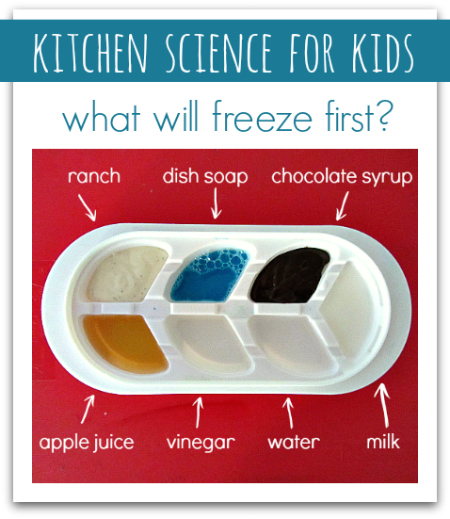 When it comes to science I usually let my kids lead with questions and suggest we investigate from there. One morning last week my son didn’t finish his milk and I asked him to please pop it in the fridge so he could have it with his lunch. Instead he asked if he could put it in the freezer to see what would happen. Of course I was game. After he put it in the freezer I asked him what he thought would happen. At 6 it was no shock that he thought it would freeze, so I asked him how long he thought it would take. That sparked this simple kitchen science experiment we did a few days later. My kids love kitchen science for kids and I love doing it with them. Fun together time with science!
When it comes to science I usually let my kids lead with questions and suggest we investigate from there. One morning last week my son didn’t finish his milk and I asked him to please pop it in the fridge so he could have it with his lunch. Instead he asked if he could put it in the freezer to see what would happen. Of course I was game. After he put it in the freezer I asked him what he thought would happen. At 6 it was no shock that he thought it would freeze, so I asked him how long he thought it would take. That sparked this simple kitchen science experiment we did a few days later. My kids love kitchen science for kids and I love doing it with them. Fun together time with science!
Our question was: Which kitchen liquid would be the first to freeze ?
- Gather your materials. You will need an ice cube tray, a line up of different kitchen liquids , a timer ( not really a must ) and a freezer. We had a measuring spoon too! Our liquids were water, vinegar, chocolate syrup, ranch dressing, dish soap, milk and apple juice.
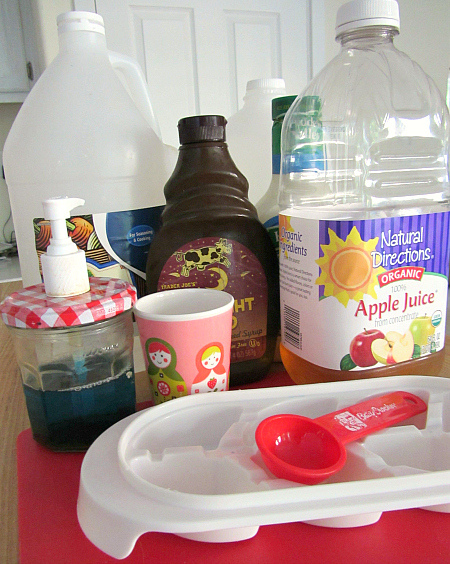
- Start by filling your tray with the different liquids.
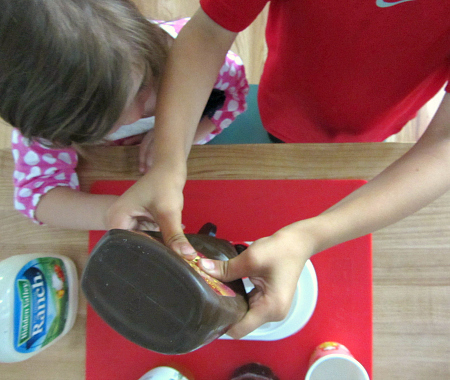 Before you ask your kids to make predictions ask them what they already know about the different liquids. My kids and I noted that we freeze water all the time and it takes an hour or two. They noted that milk will freeze so they knew that more than just water can freeze. After they go over all their background knowledge ask them to make a hypothesis or prediction if you are focusing more on results not the reason for the results. If they make a prediction simply say “why do you think that will happen?” and voila you will also get a hypothesis out of them.
Before you ask your kids to make predictions ask them what they already know about the different liquids. My kids and I noted that we freeze water all the time and it takes an hour or two. They noted that milk will freeze so they knew that more than just water can freeze. After they go over all their background knowledge ask them to make a hypothesis or prediction if you are focusing more on results not the reason for the results. If they make a prediction simply say “why do you think that will happen?” and voila you will also get a hypothesis out of them.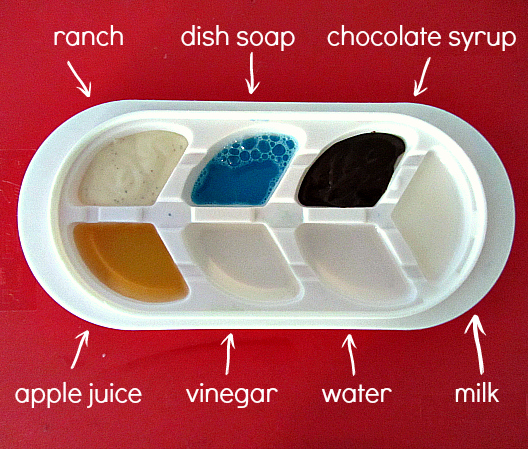
- Freeze it! We set my iPhone timer to go off at regular intervals.
- Observe what is happening. The apple juice was the first to form crystals. The water quickly caught up by the next time we checked. The dish soap had cool bubbles and was getting harder to stir, and the chocolate still tasted great although it wasn’t really ever frozen. We checked on the tray for 3 hours and by then end of that everything was solid except the chocolate syrup which still has a dough like texture days later.
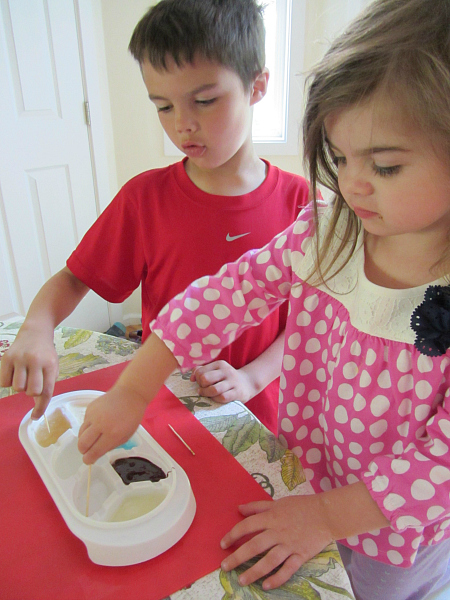
- After the results are in ask your child what they noticed. My daughter noticed that the vinegar and water froze pretty easily and that the chocolate never did. My son noticed that the thicker liquids were much slower to freeze than their thinner counterparts. That’s when I jumped in with the word viscous. We talked about how the water, milk , vinegar ,and apple juice froze faster because they all have lower viscosity than the dish soap , ranch dressing and chocolate syrup. I kept it very simple explaining that the less viscous a liquid is the easier it is to take another form and for the cold to get to every part of it. The thicker liquid was harder to freeze because the cold air had to work harder to get all of it cold enough to freeze. I tend to over explain things to my kids and have learned their signals for when my answer is shifting into a lecture. If they keep asking questions keep answering them but those blank stares are a sure fire sign that you should keep it simple, at least for now!
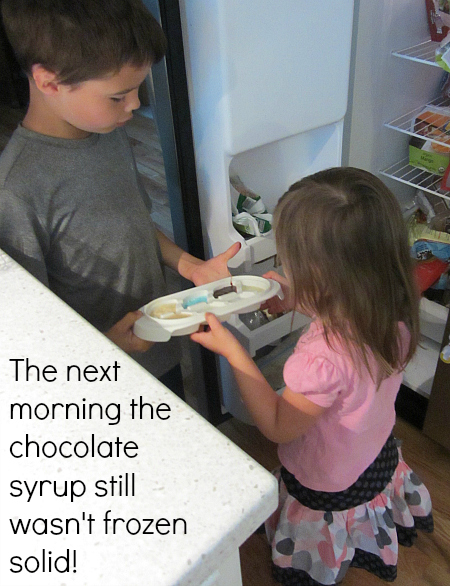
The best part about simple kitchen science for kids is that it lets your children see that science is everywhere. It’s in their kitchen and is accessible to all.
Tomorrow we are talking about how teach the scientific method to young kids with Jillian from A Mom With A Lesson Plan!


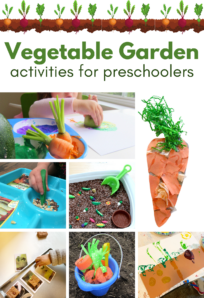

Gracie's mom says
Love it! As an early childhood educator and speech language pathologist, I LOVE activities that expand vocabulary! Viscous – FABULOUS! Answering & asking questions is so good for kids. Great idea.
jeannine: waddlee-ah-chaa says
Totally love how you followed the children’s lead! And I totally love how spontaneous and simple this learning activity is!
Going to share, pin and tweet this one!
Emma says
oooh what a great idea, and fascinating!
Joyce says
Fun!
kristina says
We are totally doing this!
Teresa says
Love this one!!! Going in our “Science To Do” folder!!! 🙂
Pragmaticmom says
This looks awesome!!!
Gina says
my kids would love this. We once did an experiment to see how long an ice pack took to freeze. they checked every 5 minutes! Lol but they loved it and they loved seeing the different stages. I will try this with them.
amber says
i am doing this with my group for school and hope it will be fun and we learn a lot i will post a comment after we finish doing it
Keesha says
What a great, easy and fun experiment. Thank you so much for sharing!
chelsiee says
The chocolate might not have frozen because the oils in it
Chris Chapman MA Physics says
Try this with different concentrations of salty water ? Maybe a solution of sodium carbonate ? AND use a deep freeze ! What is ‘ranch’, please ? We must call it something different here in the UK. Use a cheap digital thermometer with an extension probe stuck in the valley on the underside of the moulding to measure the temperature ? They may cost $8 from RadioShack-55075088
Your Physics may be a bit ‘off’. Viscous solutions get thicker as the temperature falls, but this is not directly related to the freezing temperature / time. Thicker solutions will have LESS thermal capacity than pure water, so their temperature should fall more quickly.
The actual freezing temperature is related to the concentration of the substances in solution. Calcium Chloride (drying crystals) can reduce the freezing temperature to -28 Deg C / -18.4 F ! You might also try freezing daddy’s beer and mummy’s spirits ? They will start to freeze below 0 C / 32 F and ~pure water will crystallise out first – leaving a stronger drink ! We used to make applejack ‘fire water’ this way ! NO STILL IS REQUIRED !!
Putting separate tubs containing different fluids in a freezer are liable to give confusing results. The rate of cooling is not accurately controlled and the heat capacity of each tub is likely to be different. Maybe get a sheet 1/16″ Aluminium , put the tubs on it and enclose the lot in a polythene bag ?
Marc says
I got a good chuckle out of daddy’s beers and mummy’s spirits. Looks like your family of alcoholics has got its preferences. 😉
isabella brodrick says
wow looks like fun
Marc says
The next thing to do is to stick a thermometer in it (preferably a good one) while it freezes, and note the temperature.
there are so many good questions:
– does everything freeze at the same temperature ?
– notice anything strange on the thermometer (the fact that the temperature does NOT change during freezing/thawing)
– did the water freeze at 0°C/32°F ? If not, why (impurities ? boil water first ? pression due to altitude NOT being zero).
depends how old the kids are, but it’s never too later to start good science 😉
Marco kendrick S Yao says
What is this about?
Jedrych Angelo B.Luna says
The first one to freeze was the apple juice
2nd was the fresh milk
3rd was vinegar
4th was soy sauce
5th was the fish sauce
6th was mustard
Carrie says
My kids really enjoyed it!
Bob says
What a creative activity idea! My little sister is obsessed with physics, so this should be right up her alley.